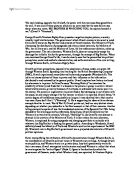"Shooting an Elephant" by George Orwell.
In the essay, "Shooting an Elephant," George Orwell describes an incident he had while working as an Imperial Police officer in Burma. A domesticated elephant had gone out of control and was ravaging a town. He was forced to make a decision on whether to follow the will of the natives, or to save the elephant's life.
One of the themes George Orwell discusses about is “pressure”. Social pressure has a tremendous influence on people. This pressure comes from friends, family, teachers, and society itself. In the essay, the natives living in the town did not like Orwell because he was a British. One day a domesticated elephant escaped its cage. It had killed a black Dravidian Coolie and was ravaging the natives’ town. As an imperial police officer, Orwell was unquestionably expected by the natives to stop the elephant in anyway possible. By the time Orwell had tracked down the elephant, a large crowd had formed behind him. Orwell knew it was wrong to kill the elephant. He had not wanted to from the beginning. He had procured an elephant gun just in case he might need it. When he finally came upon the elephant, peacefully eating outside of town, it no longer posed a threat.







